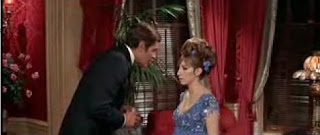An expansion of a previous post.
Musicals are in the air. Again. The recent news that Hugh Jackman is in talks to star in a purported musical adaptation of Les Miserables has us lowly bloggers ruminating on the musical renaissance that wasn’t this past decade. Circa 2001/2002 everyone was anticipating the rebirth of the musical genre but that’s where my issues with the perception towards musicals arise because I’m reticent to call the musical a film genre.
 Okay, fine the word genre points to artistic compositions with similarity in style, form or subject matter and the concept of telling stories through music and lyrics make all musicals similar. But the concept of the musical being genre in that context is different from the concept of the word “drama” as a genre. Annie Hall, Bringing Up Baby and Sideways are all comedies. In terms of story, you expect them all to tell their story with humour as a significant tool. Now, ostensibly you’d say in the same way comedies use humour musicals use music but therein lies the crux of my problem. Humour makes you laugh, whether laugh uproariously or laugh and think – it’s rooted in laughter. Music is different; all music doesn’t elicit a single response which is why I think of musicals not as a genre but as a form. Let me explain.
Okay, fine the word genre points to artistic compositions with similarity in style, form or subject matter and the concept of telling stories through music and lyrics make all musicals similar. But the concept of the musical being genre in that context is different from the concept of the word “drama” as a genre. Annie Hall, Bringing Up Baby and Sideways are all comedies. In terms of story, you expect them all to tell their story with humour as a significant tool. Now, ostensibly you’d say in the same way comedies use humour musicals use music but therein lies the crux of my problem. Humour makes you laugh, whether laugh uproariously or laugh and think – it’s rooted in laughter. Music is different; all music doesn’t elicit a single response which is why I think of musicals not as a genre but as a form. Let me explain. Musicals are like black-and-white films, or better yet silent movies. They all are made in the same way in that they look the same (for black-and-white) or “sound” the same (silent films) but you could tell gamut of stories through that single form. Musicals could vary from comedy (Singin’ in the Rain) to drama (New York, New York) to fantasy (Xanadu) or even pseudo-horror (The Rocky Horror Picture Show). I think the concept of musicals of the roaring twenties has sort of lulled us into this false belief of musicals being some sort of fantastical form of escapism, but for me I look to the Great White Way as veritable proof of the musical. The Tony’s divide their laurels in terms of musical and plays. And just like plays vary in genre, so do musicals. Maybe I am being unnecessarily fixated about this, but it always annoys me when the musical “genre” comes in for more criticism than necessary when people seem unwilling to realise that other than a story told through song a “musical” owes them nothing.
Musicals are like black-and-white films, or better yet silent movies. They all are made in the same way in that they look the same (for black-and-white) or “sound” the same (silent films) but you could tell gamut of stories through that single form. Musicals could vary from comedy (Singin’ in the Rain) to drama (New York, New York) to fantasy (Xanadu) or even pseudo-horror (The Rocky Horror Picture Show). I think the concept of musicals of the roaring twenties has sort of lulled us into this false belief of musicals being some sort of fantastical form of escapism, but for me I look to the Great White Way as veritable proof of the musical. The Tony’s divide their laurels in terms of musical and plays. And just like plays vary in genre, so do musicals. Maybe I am being unnecessarily fixated about this, but it always annoys me when the musical “genre” comes in for more criticism than necessary when people seem unwilling to realise that other than a story told through song a “musical” owes them nothing.What do you think?






















.bmp)
.bmp)
.bmp)























